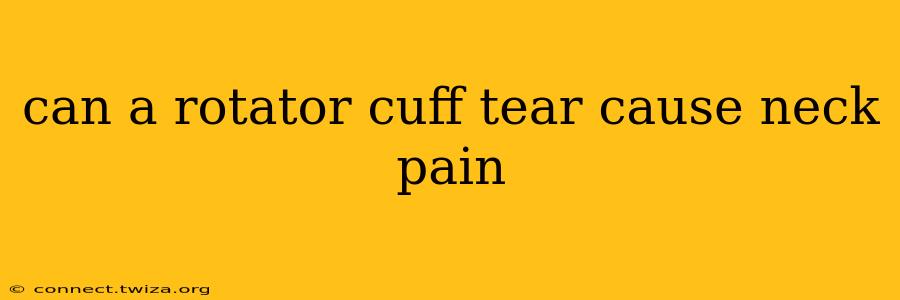A rotator cuff tear, an injury to the group of muscles and tendons surrounding the shoulder joint, can indeed cause neck pain, although it's not a direct, immediate cause in most cases. The connection is more intricate and involves the complex interplay of muscles, nerves, and the overall biomechanics of the upper body. This article will explore this relationship, answering frequently asked questions and providing valuable insights.
How Can a Rotator Cuff Tear Lead to Neck Pain?
The pain experienced in the neck isn't usually caused by the tear itself directly affecting the neck. Instead, it's often a result of compensatory mechanisms the body employs to cope with the shoulder injury. Here's how it works:
-
Muscle Imbalances: When your rotator cuff is injured, your shoulder muscles will be weakened or strained. To compensate for this weakness, other muscles, including those in your neck and upper back, work overtime. This overuse can lead to muscle strain, stiffness, and pain in the neck and upper back.
-
Postural Changes: A painful shoulder often leads to changes in posture. You might unconsciously hunch your shoulders or tilt your head to relieve pressure on the injured shoulder. These postural changes can strain the neck muscles and lead to chronic neck pain.
-
Referred Pain: In some cases, the pain from a rotator cuff tear might be referred pain. This means the pain originates in the shoulder but is felt in a different location, such as the neck. The nerves supplying the shoulder and neck are interconnected, making referred pain a possibility.
-
Nerve Irritation: Severe rotator cuff tears, especially those involving significant inflammation, might impinge on nerves in the shoulder region. This can indirectly cause radiating pain that extends into the neck.
What Other Symptoms Might Accompany Neck Pain from a Rotator Cuff Tear?
Several other symptoms often accompany neck pain stemming from a rotator cuff tear. Identifying these can help your doctor make an accurate diagnosis:
- Shoulder Pain: This is the most prominent symptom, often described as sharp, aching, or burning pain, especially with movement.
- Weakness in the Shoulder: Difficulty lifting or rotating the arm.
- Limited Range of Motion: Inability to fully raise, lower, or rotate the arm.
- Clicking or Popping in the Shoulder: This can indicate damage to the joint itself.
- Swelling or Bruising: Often visible around the shoulder.
Can Neck Pain Be the Only Symptom of a Rotator Cuff Tear?
While less common, it's possible to experience neck pain as the primary symptom, with minimal or subtle shoulder pain. This can make diagnosis more challenging, requiring a thorough physical examination and potentially imaging studies.
How Is Neck Pain from a Rotator Cuff Tear Diagnosed?
Diagnosing neck pain linked to a rotator cuff tear typically involves:
- Physical Examination: Your doctor will assess your range of motion, strength, and palpate the affected areas.
- Imaging Tests: X-rays, MRIs, or ultrasound scans might be necessary to visualize the rotator cuff and identify any tears.
- Neurological Examination: This helps rule out other neurological causes of your neck pain.
What Treatments Are Available for Neck Pain Related to a Rotator Cuff Tear?
Treatment will focus on addressing both the rotator cuff tear and the resulting neck pain. Options may include:
- Physical Therapy: This is usually the first line of treatment, focusing on strengthening the shoulder muscles, improving range of motion, and correcting postural imbalances.
- Medication: Pain relievers (NSAIDs) or muscle relaxants might be prescribed to manage pain and inflammation.
- Corticosteroid Injections: In some cases, these injections can help reduce inflammation and pain.
- Surgery: Surgery might be necessary for severe tears that don't respond to conservative treatment.
Can I Prevent Neck Pain Associated with a Rotator Cuff Tear?
While you can't completely eliminate the risk of a rotator cuff tear, you can take steps to reduce your chances of developing neck pain associated with one:
- Maintain Good Posture: Correct posture helps prevent muscle imbalances and strain.
- Strengthen Shoulder and Neck Muscles: Regular exercise strengthens the supporting muscles and improves stability.
- Warm Up Before Activity: This helps prepare muscles for exertion and reduces the risk of injury.
- Use Proper Lifting Techniques: Avoid lifting heavy objects incorrectly, which can strain the shoulder and neck.
This information is for general knowledge and does not constitute medical advice. If you are experiencing neck pain or shoulder pain, it's crucial to consult a medical professional for proper diagnosis and treatment. They can determine the underlying cause of your pain and develop a personalized treatment plan.
